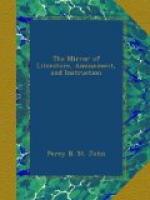(Here is a random string of poetical gems:)—
So, we’ll go no more a roving
So late into the night,
Though the heart be still as loving,
And the moon be still as bright;
For the sword out-wears its sheath,
And the soul wears out the
breast,
And the heart must pause to breathe,
And Love itself have rest.
Though the night was made for loving,
And the day returns too soon,
Yet we’ll go no more a roving
By the light of the moon.
Oh, talk not to me of a name great in
story.
The days of our youth are the days of
our glory;
And the myrtle and ivy of sweet two-and-twenty
Are worth all your laurels, though ever
so plenty.
What are garlands and crowns to the brow
that is wrinkled?
’Tis but as a dead flower with May-dew
besprinkled.
Then away with all such from the head
that is hoary!
What care I for the wreaths that can only
give glory?
Oh, Fame! if I e’er took delight
in thy praises,
’Twas less for the sake of thy high-sounding
phrases,
Than to see the bright eyes of the dear
One discover
She thought that I was not unworthy to
love her.
There chiefly I sought thee—there only I found thee; Her glance was the best of the rays that surround thee; When it sparkled o’er aught that was bright in my story, I knew it was love, and I felt it was glory.
TO THE COUNTESS OF B——.
You have asked for a verse,—the
request
In a rhymer ’twere strange
to deny,
But my Hippocrene was but my breast,
And my feelings (its fountain)
are dry.
Were I now as I was, I had sung
What Lawrence has painted
so well;
But the strain would expire on my tongue,
And the theme is too soft
for my shell.
I am ashes where once I was fire,
And the bard in my bosom is
dead;
What I loved I now merely admire,
And my heart is as grey as
my head.
My Life is not dated by years—
There are moments which
act as a plough,
And there is not a furrow appears
But is deep in my soul as
my brow.
Let the young and brilliant aspire
To sing what I gaze on in
vain;
For sorrow has torn from my lyre
The string which was worthy
the strain.
[2] Though Lord Byron, like
most other persons, in writing to
different
friends, was some times led to repeat the same
circumstances
and thoughts, there is, from the ever ready
fertility
of his mind, much less repetition in his
correspondence
than in that, perhaps, of any other multifarious
letter-writer;
and, in the instance before us, where the same
facts
and reflections are, for the second time, introduced,




